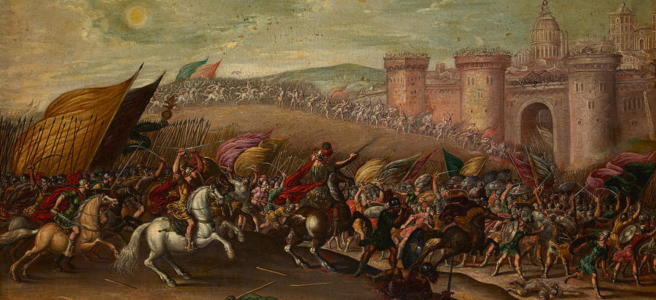Ted Grimsrud—March 25, 2024
The Apostle Paul was a follower of Jesus. And his social views actually complement Jesus’s rather than contradict them, contrary to what many Christians have believed. In this post I offer a detailed look at the infamous passage in Paul’s letter to the Romans that, one could say, has launched many ships and other weapons of war. Romans 13:1-7 often serves as a counter-testimony in Christianity to the idea that Paul may have taught a principled nonviolence in agreement with Jesus. As well, Romans 13 is often seen to go against the idea that Paul understood Jesus’s peaceable way as normative for Christian social ethics.In reading a number of writings where Christian thinkers argue against pacifism, I discovered that in every single case—across a wide spectrum of theological positions—those who reject pacifism cite Romans 13:1-7 as a major reason. I will show why this text should not be read as counter to pacifism.
Setting the context for Romans 13:1-7
Our interpretation of Romans 13:1-7 should begin with reading these verses in light of their broader biblical context. Our passage is not the only place in the Bible where the political Powers are addressed. From Egypt in Genesis and Exodus, then Assyria, Babylon, Persia, and down to Rome in the book of Revelation, the Bible shows empires rebelling against God and hindering the healing vocation of God’s people. The entire Bible could appropriately be read as a manual on how people who follow Torah in seeking to love God and neighbor negotiate the dynamics of hostility, domination, idolatry, and violence that almost without exception characterize the world’s empires.
Romans 13:1-7 stands within this broader biblical context of antipathy toward the empires. If we take this context seriously, we will turn to these Romans verses and assume that their concern is something like this: given the fallenness of Rome, how might we live within this empire as people committed uncompromisingly to love of neighbor? Paul has no illusions about Rome being in a positive sense a direct servant of God. Paul, of course, was well aware that the Roman Empire had unjustly executed Jesus himself (and, according to tradition, in time executed Paul as well). As evil as these Powers might be, though, we know from biblical stories that God nonetheless can and does use the corrupt nations for God’s purposes—nations that at the same time remain under God’s judgment.
In his letter to the Romans, Paul surely had this biblical sensibility in mind as he addresses Jesus’s followers in the capital city of the world’s great superpower—the entity that had executed Jesus. Paul begins with a focus on the perennial problem related to empires—idolatry (see my previous post, “Paul’s critique of idolatry”). He discusses two major strains of idolatry in chapters 1–3: (1) the Empire and its injustices that demand the highest loyalty and (religious) devotion and (2) a legalistic approach to Torah that leads to its own kind of violence (witness Paul’s own death-dealing zealotry).









